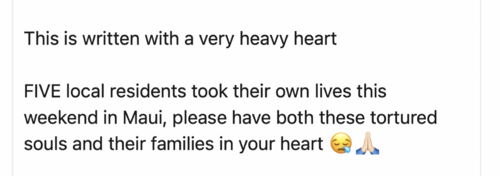All that said, seeing the major effect on the local winds created by the mountain wave is very informative,
I haven't seen/heard in any of the media (TV/Newspaper/etc) anything about mountain-wave setup being the cause of the wind .. every one of them were putting it on Dora.
Just to clarify - Hurricane Dora was WAY too small and WAY too far away to have been a factor
I'd looked on satellite when the fires were going, & was honestly kinda surprised how far the hurricane was from HI, from the way the news was talking, I expected it to be right near the islands.
I didn't read the linked site in Mike's post, but...
Being where I'm at in Colorado, I've seen/felt the type of wind a mountain-wave can do plenty of times...its just part of living here, you will get mountain waves & windstorms. (and other than the associated mountain wave cloud, its an otherwize clear day/night).
In all honestly the mountain-wave, if thats what happened makes allot more sense to me (than a hurricane that atleast appeared to be pretty far away). Because if that were to happen at the same time as a wildfire, its very simple: you have an uncontrollable disaster on your hands. About the only thing everyone (including firefighters) can do is get out of the way.
Sounds pretty similar to what happened here back at the end of 2021: The Marshall Fire that destroyed over 1000 homes, fueled by drought & more importantly mountain-wave winds.
I'm too far south to have seen flames or anything, but could certainly see the smoke plume & cloud above it.
Only a couple people died in the Marshall Fire here, I have no idea if that area has sirens or if they were used (never saw any mention either way), but it was out on the TV & radio. I think the biggest difference here vs HI is access - here a suburban area with multiple roads for people to evacuate/scatter into the surrounding areas, vs HI an area with very limited roads to get out on (and limited amount of area to go as well).
-----------
With the HI sirens remaining silent, I see that as a tough one:
If to the general population they were known as "tsunami sirens", sounding them would mean people would head inland by default, but then you'd also have people heading away from the fire. Sounds like an even worse traffic mess and allot of confusion to me. Basically a no-win situation.
This is where a multi-tone siren would be helpful....but if and only if the people were well trained on what the different tones meant (and no more than a couple tones were used)
-----------
Were the winds forecast (in particular a mountain-wave if thats what happened?)
Here they'll give high-wind watches/warnings, and when a mountain-wave setup is predicted, media typically won't use that term in the general forecast, but it will be in the local NWS office's AFD.
May be the fact that weather is different here, but that's one thing they seem to be able to pretty reliably predict/forecast.
-----------
Its ofcourse been all over the news & net that the blaze may have been started by downed powerlines, and the power company should have cut power to the lines in that area before anything happened.
but if power companies shut down sections of the grid every time there was wind, they'd be hounded with complaints about running an unreliable system
Ideal solution ofcourse would be that all lines should be underground. Unfortunately due to cost that's just not practical(atleast from what I've heard). It'd also be allot more difficult to do in mountain areas than in flat/plains areas.
Could it be done? Certainly. Should it? I think a hard look at individual areas would be needed - what the weather is like, how 'burnable' the landscape is, etc. Then the big question: who's going to pay for it? if "the power company" in reality that means "their customers" in the form of higher electric rates. If "the government", then that means "taxpayers" (but its also spread over a larger number of people, though only some would benefit from it)

